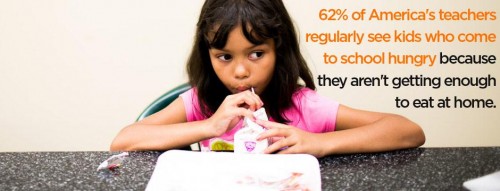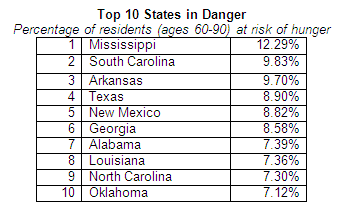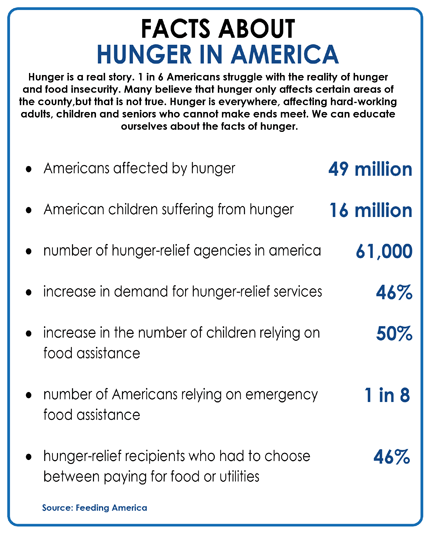 I know nothing of serious hunger. I have vague memories as a child of fasting on Good Fridays, my Mother waiting until the stroke of 3, the time of Christ’s death, to give us a snack. I taught more than a few children who received free breakfasts and free lunches and whose parents struggled to keep afloat. I went four days without food as part of a NOLS course and lost over 20 pounds; carrying heavy packs, our group walked 50 miles to our pick-up point as part of a final test.
I know nothing of serious hunger. I have vague memories as a child of fasting on Good Fridays, my Mother waiting until the stroke of 3, the time of Christ’s death, to give us a snack. I taught more than a few children who received free breakfasts and free lunches and whose parents struggled to keep afloat. I went four days without food as part of a NOLS course and lost over 20 pounds; carrying heavy packs, our group walked 50 miles to our pick-up point as part of a final test.
After the first 24 hours and the burning of 5000 or 6000 calories, all we spoke of was food – meats and fruit, milk and beer, fries, vegetables and ice cream, eggs and bacon. I remember dreaming of a milkshake.
 On our final night I lost my ability to master my body with my will; I had no reservoirs of energy left. Every action – setting up a tent, gathering fire wood, fetching water – took much, much longer to execute than had been the case. Only adrenaline, and the knowledge that our instructors were waiting with ice chests of food a few miles away, carried us over the last ridgelines the next morning.
On our final night I lost my ability to master my body with my will; I had no reservoirs of energy left. Every action – setting up a tent, gathering fire wood, fetching water – took much, much longer to execute than had been the case. Only adrenaline, and the knowledge that our instructors were waiting with ice chests of food a few miles away, carried us over the last ridgelines the next morning.
My four days of deprivation was a lark, a choice, a time that I knew would have a definitive ending when money in my pocket, and a job at home would put an end to my hunger’s grinding cramps. What must it be like to always have hunger as a tangible presence, like a phantom limb, unseen but aching? What must it be like to see that ache in one’s children, to listen to them cry because they have not had enough to eat?
It requires little imagination to picture hungry Americans. Google the words Food Banks or Hunger in America. In less than second gigabytes of reliable information pour out to anyone interested.
Therefore, I do not understand how grown men and women could act to deny food to poor children, to old men and women, to the out of work and the destitute. On Thursday, September 19, House Republicans* voted to cut Food Stamps for hungry Americans by $40 billion over the next 10 years.
 Children under 18 make up 47% of recipients; 8% are the destitute elderly; 43% of those who receive food aid live at or below the US poverty line of $23,000 a year for a family of four. The average monthly benefit of food assistance comes to $132.94 a month.**
Children under 18 make up 47% of recipients; 8% are the destitute elderly; 43% of those who receive food aid live at or below the US poverty line of $23,000 a year for a family of four. The average monthly benefit of food assistance comes to $132.94 a month.**
Spending on food stamps has increased; it has done so because the slow recovery from 2008’s economic crash has been uneven: “adjusted for inflation, the income of the top 1 percent rose 31% from 2009 to 2012, but the real income of the bottom 40% …fell 6%.”*** Of course the demand for food assistance has increased.
Instead of cutting in other areas, House Republicans chose to target the poor. The poor have no money and therefore no power. For example, these same Representatives did not target corporate tax subsidies. Between 2008 and 2012, 56% of the total corporate tax breaks went to four ‘industries’ – 17% to financial services – read big banks and Wall Street; 14% went to gas and electric utilities; 14% went to Tele-Communications concerns; 11% went to oil, gas and pipeline companies.^ Corporations have mountains of money and therefore power.
Statistics are useful but bloodless. They cannot penetrate the mind-set of those Representatives who voted for the cuts, men and women who presumably have the capacity for empathy and who receive salaries of over $174,000 a year plus health coverage and a retirement plan. I cannot understand their principled malice.
When I see one of them on the news repeating their nauseous talking points unthinkingly about waste and freedom and reform, I half expect him or her to stop, their frustration with euphemisms coming to a breaking point, and tear off a slippery mask and reveal some creature full of teeth and begin channeling Dickens: “Are there no prisons? … and the…workhouses—are they still in operation?” ^^ And upon that glorious release finally giving vent to everything they actually believe about the moral failings of the poor, their bland, pudgy faces burning with Calvinist ardor, their love of country at last apparent to all in the moisture of their just and merciless eyes.
*15 Republicans and every Democrat voted against the cuts.
** http://m.theatlantic.com/health/archive/2012/09/w : “Who Benefits From Food Stamps” by Brian Fung
*** “Free To Be Hungry” by Paul Krugman in The New York Times, Monday, September 23, 2013
^http://thinkprogress.org/climate/2011
^^ A Christmas Carol by Charles Dickens